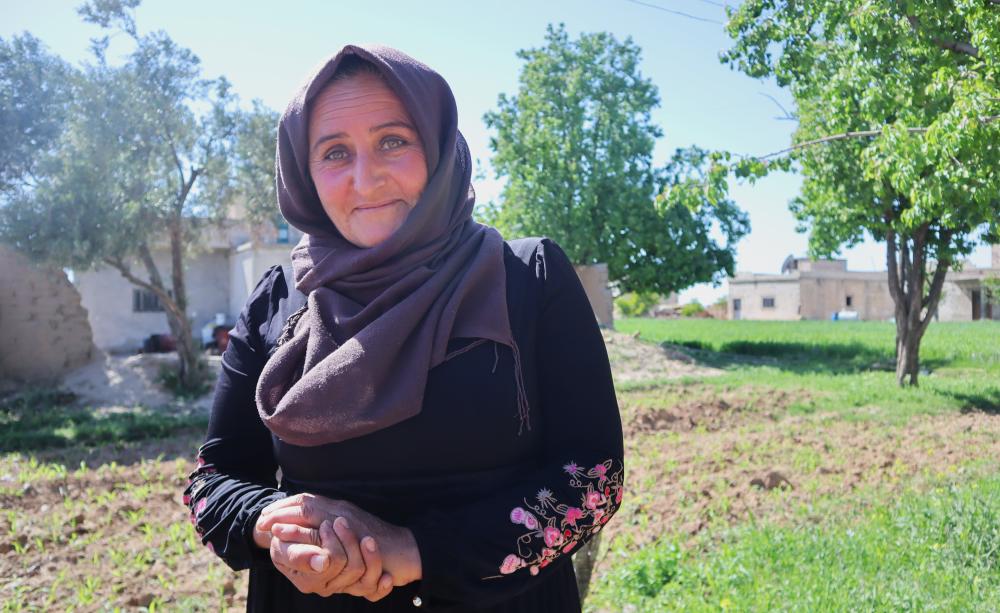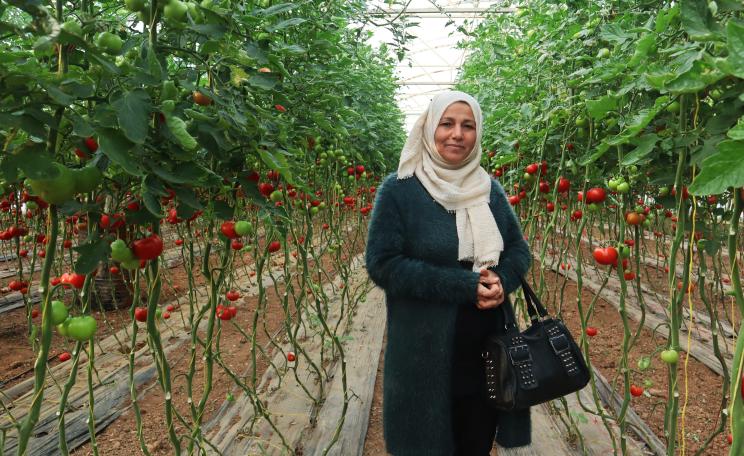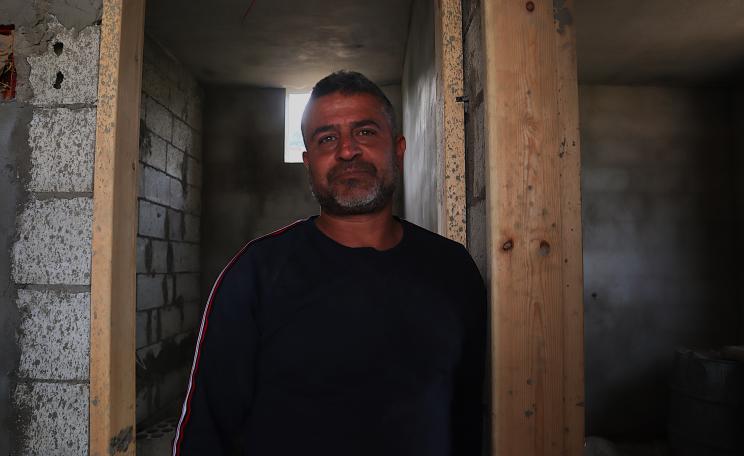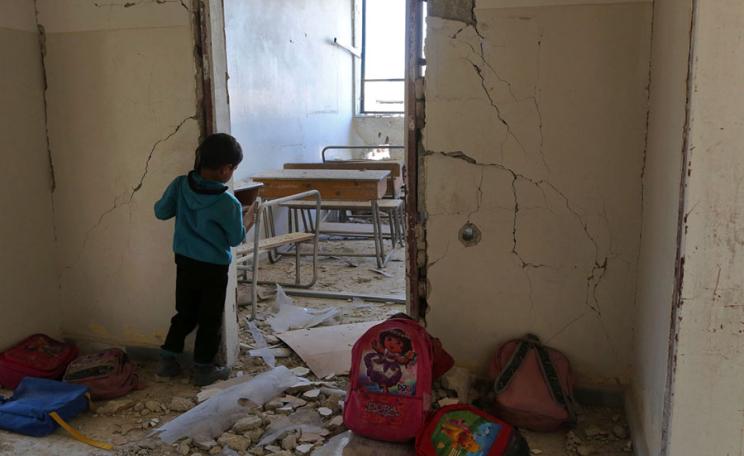We’re self-sufficient. We don’t want to rely on trade or merchants. We grow everything ourselves—even the seeds.
Najah Hussein Abroush runs her fingers through a fistful of dry soil outside her home in Boraz, a village nestled along the Euphrates River near the Turkish border.
The earth crumbles in her palm. “Since the war began, our trees and crops haven’t been the same,” says the 45-year-old farmer. “The land is polluted—probably from the airstrikes, bombs, and drones.”
For generations, these wide-open plains fed the region and stood as one of the cradles of agriculture.
This article has been published through the Ecologist Writers' Fund. We ask readers for donations to pay some authors £250 for their work. Please make a donation now. You can learn more about the fund, and make an application, on our website.
Dreams
But after 13 years of civil war, compounded by a centralised agricultural model imposed by the Assad regime (1971–2024), local seed varieties have all but vanished.
Before the war, Najah and her neighbours would save seeds from one harvest to plant the next. But displacement during the ISIS occupation in 2014, followed by a return to degraded soil in 2015, changed everything.
“We had to buy imported seeds. They were low quality and destroyed the network of seed exchanges between farmers,” she explains.
Now, faced with severe drought, salinised groundwater, and failing crops, Najah has doubled her use of fertiliser compared to a decade ago—without better yields.
“It’s never enough,” she says, eyes scanning her barren field. What she dreams of is simple: “Real seeds. Native ones. And water.”
De-escalation
But in northeastern Syria, even water has become a weapon.
Local authorities accuse Turkey of restricting the flow of the Euphrates through upstream dams. In late 2024, Turkish airstrikes damaged the Tishrin Dam's power generators, cutting off water and electricity for hundreds of thousands.
In January 2025, Turkish drones targeted a protest near the dam, killing at least 20 civilians and injuring 200 more—an attack Human Rights Watch described as an “apparent war crime.”
Though a fragile political agreement later allowed civilians to return and brought limited de-escalation, the damage—both environmental and human—is deep.
Yet, in the face of devastation, new initiatives are taking root.
Reclaiming
More than 30 kilometres from Boraz, in the town of Kobane—once a symbol of resistance against ISIS—a reforestation nursery now flourishes on a hillside near the Turkish border wall.
Managed by the Environment Bureau of the Autonomous Administration of North and East Syria (AANES), it grows more than 100,000 trees and flowering plants.
We’re self-sufficient. We don’t want to rely on trade or merchants. We grow everything ourselves—even the seeds.
“We’re self-sufficient. We don’t want to rely on trade or merchants,” explains Aref Bali, co-chair of the environmental office. “We grow everything ourselves—even the seeds.”
Further south, in the rural community of Al-Chaddadeh, a women's collective named Green Braids has been replanting hope, one sapling at a time.
The group—named after the braids worn by Kurdish women fighters—has spent the past five years reclaiming degraded land through community-based nurseries.
Sprouting
In one such initiative, women gather in a primary school courtyard, preparing pistachio seeds in black plastic bags. Their goal: to grow 10,000 trees.
“We collect seeds from trees, gardens, and sometimes receive them as gifts,” says Lolav Sheikha, a project coordinator. Many of these species had been marginalised under Assad-era agricultural policies that favoured monocultures.
The group faced resistance in earlier years. Lolav recalls how one member smuggled in a large seed stock, only to have it confiscated at the airport.
“He was threatened with prison,” she says. But since the fall of Assad in December 2024 and a shift in political dynamics—including the symbolic dissolution of the PKK—environmental initiatives are gaining more space.
In Hazima, a village outside Raqqa, agricultural engineer Abdel Kader Ismail Al-Fares inspects rows of sprouting seedlings.
Pollutants
With support from Lebanese NGO Buzuruna Juzuruna ("Our Seeds, Our Roots")—which distributes open-pollinated seeds conserved in Germany—he is leading a pioneering pilot project to plant 100,000 seedlings from heirloom varieties.
“The seeds we had before were mostly imported from Turkey. They were poor quality and you had to keep buying them. Now, we’re testing these local seeds, documenting everything—type, origin, planting date—so we can see what works,” he explains.
The aim is not only to cultivate crops but to extract, save, and redistribute seeds among other farmers, reviving collective autonomy.
This kind of agriculture is also more resilient in a changing climate. “We had a lot of drought this year. These local seeds waste less water, need fewer fertilisers, and work better in degraded soils,” Abdel Kader says.
Chemical use is a concern in a region deeply scarred by war and the oil industry. During ISIS’s control from 2013 to 2017, makeshift oil refineries proliferated, dumping pollutants into the soil and groundwater.
Regeneration
A few kilometers away, former chemistry teacher Mahmoud Ahmad al-Jasam walks his land, much of it lifeless. “This was where the illegal refinery was,” he says, pointing to a scarred plot.
“The soil still carries the residue.” He’s working with Abdel Kader to test phytoremediation—plant-based decontamination—and will soon try growing vegetables using the new seed stock. His hope is that the seeds can heal the soil, just as they might help his family.
“I lost a lot in this war,” Mahmoud says. “But I stayed. I farm for my children—and for the country. Even if we’re losing money, it’s worth it.”
Across northeast Syria, farmers like Najah, Abdel Kader, and Mahmoud are not just growing food. They’re growing resistance—to war, to dependence, to despair.
For them, the path to ecological regeneration is inseparable from political struggle, memory, and dignity. In a land scorched by bombs and poisoned by oil, a few seeds, carefully chosen and lovingly planted, may yet offer the roots of something new.
This Author
Amélie David is a freelance journalist based in Lebanon covering environmental and climate change stories. This article has been published through the Ecologist Writers' Fund. We ask readers for donations to pay some authors £250 for their work. Please make a donation now. You can learn more about the fund, and make an application, on our website.







